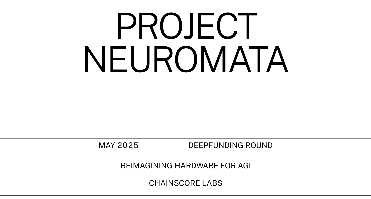
Prasad Kumkar
Project OwnerOversees hardware-software co-design, leads paradigm survey, manages milestones and reviews.
DEEP Connects Bold Ideas to Real World Change and build a better future together.
Coming Soon
Project Neuromata will explore brain-inspired hardware for AGI, targeting the critical bottlenecks of recursive reasoning, probabilistic inference, attention mechanisms, and large-scale knowledge retrieval. We will survey and benchmark four non-von Neumann paradigms - temporal (race logic), asynchronous neuromorphic, analog in-memory computing, and processing-in-memory. Using Python simulations, FPGA prototypes, and remote neuromorphic boards over defined metrics such as latency, energy per operation, accuracy, scalability. Integrated with OpenCog Hyperon, Neuromata aims to demonstrate a proof-of-concept accelerator achieving 10x-50x speedups and 10x–100x energy savings on AGI workloads.
The purpose of this RFP is to identify, assess, and experiment with novel computing paradigms that could enhance AGI system performance and efficiency. By focusing on alternative architectures, this research aims to overcome computational bottlenecks in recursive reasoning, probabilistic inference, attention allocation, and large-scale knowledge representation. Bids are expected to range from $40,000 - $80,000.
Conduct a comprehensive survey of alternative computing paradigms (temporal/race logic asynchronous neuromorphic analog in-memory PIM) and map each to AGI workload requirements (recursive reasoning inference attention graph traversal). Define target tasks and select the top 2–3 paradigms for deeper study.
A “Paradigm & Plan” report listing candidate paradigms their AGI alignments and a detailed experiment plan—simulation tools prototype platforms target metrics and evaluation procedures.
$10,000 USD
Stakeholder approval of the paradigm report; clear mapping of each candidate to specific AGI tasks; a complete, actionable experiment plan ready for Phase 2.
Perform an exhaustive literature review on the selected paradigms collating existing hardware and simulation performance data for AGI-relevant tasks. Define quantitative benchmarks: tasks datasets metrics (latency energy per operation accuracy scalability).
A “Review & Benchmarks” document summarizing state-of-the-art results and a benchmark specification detailing each test case measurement methodology and success thresholds.
$10,000 USD
Completion of a literature review covering all target paradigms; finalized benchmark suite approved and ready for prototype testing; baseline performance numbers identified.
Develop and run prototype experiments for the top paradigms: build Python simulations FPGA proofs-of-concept or use neuromorphic hardware access. Execute benchmark tests on AGI tasks and collect performance and accuracy data.
An “Experimental Results” report detailing prototype implementations measured speedups energy efficiency gains accuracy trade-offs and a feasibility analysis with recommendations for refinement.
$10,000 USD
Successful demonstration of at least two prototypes; empirical data showing ≥10× improvement in key metrics on target tasks; selection of the best approach(s) for Phase 4.
Refine the chosen prototype(s) integrate a MeTTa-compatible driver for offloading AGI primitives and prepare a live or recorded demo. Conduct full evaluation across all benchmarks and document results.
A working prototype or simulation that accelerates a MeTTa reasoning script a comprehensive evaluation report comparing performance energy accuracy and scalability against CPU/GPU baselines plus a demo slide deck.
$10,000 USD
Demonstration of an AGI task on Neuromata with ≥10× speed or energy gains and ≤2% accuracy loss; delivery of final evaluation report and demo materials; clear roadmap for scaling to a full-scale hardware design.
Reviews & Ratings
Please create account or login to write a review and rate.
Check back later by refreshing the page.
© 2025 Deep Funding
Join the Discussion (0)
Please create account or login to post comments.